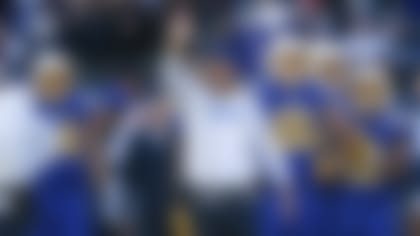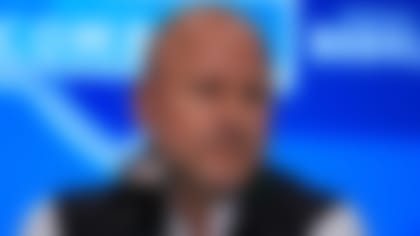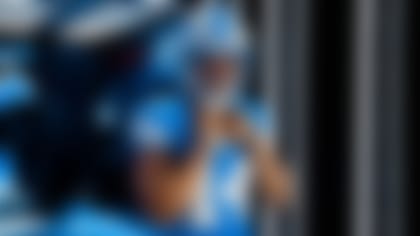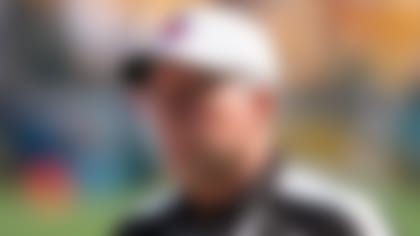If there's one certainty about the popular HBO docuseries Hard Knocks, which chronicles the daily activities of NFL clubs during training camp, it is that the camera will always find colorful personalities like Chargers wide receivers coach Phil McGeoghan.
His presence jumped off the screen this summer, grabbing your attention the way a hammer does when it lands against glass. Intense and commanding during meetings with his players, he made his points with language often found in the dim, smoke-filled halls of a late-night comedy club.
The words, which would draw the ire of the FCC if reprinted here, were salty enough to get him called out during the post-show. It was all in good fun, so McGeoghan -- who has coached at either the pro or college level for the past 14 years after a four-year career as an NFL receiver -- played along. He apologized to his children on social media for his potty mouth and pledged to donate an unspecified amount to a charity of his followers' choice for every bad word that was broadcast. Later, the Chargers organization joined in and committed matching donations to St. Jude Children's Research Hospital in what came to be known as Curses for a Cause.
It would not be the only time McGeoghan sought to turn a negative into a positive this August. Only days after watching replays of Jacob Blake, an unarmed Black man, being shot in the back multiple times by a Kenosha, Wisconsin, police officer, McGeoghan, who is biracial, fumed at another example of lethal force replacing due process in a situation involving police and someone of color.
Never one to run from a fight, he confronted some on Twitter who appeared to condone the actions of the officer, but quickly realized there was no "win" in that. He wanted to help produce positive change, but how?
Nearly three decades earlier, as an impressionable 14-year-old, he'd had his own bad experience with police, who stopped him and some friends for possession of alcohol as minors. Things took a turn for the worst and, McGeoghan says, he was beaten and demeaned by one officer, a memory written in bold ink in his mental diary, never to be erased or forgotten.
The Blake shooting made that moment fresh again. Something needed to be done, but what? He spoke to friends in western Massachusetts, where he grew up, then took to Facebook and posted a call to action to bridge the divide between police and the youth in communities around his hometown of Agawam, roughly 95 miles west of Boston.
"In an effort to develop and renew our relationships between our community and our law enforcement, I am pleased to announce we have begun initial discussions about a program named ALLY (Acknowledge, Listen, Learn, Youth)," he wrote. "I care deeply for our nation's youth and have dozens of close friends and family who are GOOD cops. We will bring our community together and be an example of what education, empathy and respect look like. This is a two-way street, and I will be working closely with both the Agawam High School Football team and the Agawam Police Department on a number of topics."
Then he spelled out the areas of focus:
- Race relations and inclusion.
- What to do if you are pulled over.
- De-escalation training.
- Increasing (not defunding) our situational training, education and relationships in our community between Black and Brown people and law enforcement.
- Continue to demand justice and push for reforms that improve public safety and address systemic racism.
- Fight for due process for all people.
- Show our children what great cops of all races are doing for us daily.
- Holding adults in positions of power accountable for these steps.
- Provide ride-along and career days.
- Have uncomfortable conversations.
"My heart will always be with you all in Western Mass," he continued. "To my family in Agawam and Springfield, I have not forgotten about you, I love you and I want to help. I was the victim of extreme police brutality, racism and undue process at the hands of one terrible, evil, racist, cowardly officer from the Agawam Police Dept. This encounter scarred me figuratively and literally. Although this happened in 1993, it still is in the forefront of my mind when I see Black and Brown people killed without due process.
"I can compartmentalize that as an isolated incident and accept that 99 percent of the police would never do that to another person of color. The problem is a lot of people are scared of the good cops, too. I am a man of action and I only know one way to live: be a person that makes your community better. I have friends and family that have been mistreated by police, I have friends and family who are GREAT policemen and women that would NEVER mistreat anyone. We are going to set an example of what a community can do with initiative, empathy, resolve and understanding. Seek solutions, be the change and treat everyone -- regardless of race, religion or sexual orientation -- the SAME!"
"I care deeply for our nation's youth and have dozens of close friends and family who are GOOD cops. We will bring our community together and be an example of what education, empathy and respect look like." -- Phil McGeoghan
John Benjamin is the head football coach at Agawam High. He has seen and heard a lot over the years, but the phone call he received at 11 p.m. on a Friday last month will never leave him. McGeoghan was on the other end of the line, and it wasn't long before his passion had turned to tears as he explained not only what he wanted to do to bring about social change, but why he needed to do it.
Slowly, he began recounting the time he and a group of teenage friends, wanting to be cool and hang with the older kids, pulled up to a convenience store and slipped a few dollars to someone outside to buy them some beer. They didn't think twice about it. It was just something young people sometimes do when parents are out of town and a party is going down.
McGeoghan knew it was wrong, but young boys will be young boys. He planned to drink only two beers because that was all he could tolerate without throwing up. But he never got the chance because police pulled over the car. Things went from zero to 100 in the short walk from the patrol car to the boys' car. As McGeoghan remembers it, a gun was drawn on the driver and the boys were told to get out of the car.
McGeoghan said he was thrown against the car and handcuffed so firmly it broke his skin. Racial slurs followed. Frightened, McGeoghan didn't know if the officer was trying to scare him straight or was an actual threat. The answer came when they got to the precinct and the cop, according to McGeoghan, roughed him up in a cell.
"Honestly, it was one of the most powerful conversations I've ever had," Benjamin said. "It was the first time I had heard of it. I never expected that something like that could have happened in Agawam, but it did. And especially couldn't imagine it happening to a kid like Phil. He was a fantastic young man when he was in high school."
McGeoghan then began explaining what he wanted to do and asked if Benjamin could work with him to bring his players and their families together with police. He wasn't looking to place blame or pick a side. He wanted everyone to be willing to open their hearts and minds in an effort to see the situation from the other's vantage point.
Benjamin phoned the local police chief the next day -- the two are friends -- as well as some police officers he knows. They were all onboard. McGeoghan then used his hometown connections to arrange a call with Valdamar Brower, the head football coach at Springfield Central High. If he could get the two biggest football programs from the area to buy in, there was reason for hope.
Brower didn't hesitate. He found somewhat of a kindred spirit in McGeoghan. They shared a similar past in that both are biracial, both were local football stars who earned college scholarships and both went into coaching when their playing careers were over. And yet, McGeoghan also expanded Brower's understanding of how the unrest in the streets was weighing on young boys and men, particularly those of color.
"As a coach, I'm running a year-round football program and just kind of really focused on getting the guys to college, giving them a better situation and just making sure they're staying out of trouble and getting their bodies better with strength and conditioning," Brower said. "We were able to be with them and deflect a lot of that stuff, but this COVID situation really opened up a lot of things because we weren't able to be with the guys (in person) every day."
They communicated primarily over computers, and what Brower realized is that his players were more emotionally affected by what was taking place in the streets than he realized.
"They're angry. They're upset. Scared. There's a lack of trust," he said of his players. "All those kinds of emotions are taking place. It's very discouraging and upsetting to me because I really believe it's just the minority (of officers)."
With both coaches onboard, McGeoghan then turned to law enforcement. He had the group speak with Joe Gentile, president of the International Brotherhood of Police Officers in Springfield. What McGeoghan found is that local law enforcement had been attempting to build that bridge for years.
"But obviously with someone like Phil behind it, it's helpful to us and it will be helpful to the kids," Gentile said. "I only learned recently about his back story. I think it will lend a lot of credibility to what he's talking about and trying to do. I love his perspective in that as much as he had a negative interaction (with an officer), he has had a lot of tremendously good interactions and doesn't want to make it about one thing."
The thing about McGeoghan is that he applies that same passion we saw on Hard Knocks to his own life. When he tells his receivers, "No block, no rock" -- meaning, you had better block in the run game or there won't be any passes coming your way -- what he's really telling them is they have to go above and beyond. Which is why he didn't stop with contacting the police union. His next call was to the chief law enforcement officer in the region, Hampden County district attorney Anthony Gulluni.
Agawam has a population of just under 30,000 residents, while neighboring Springfield has just over 150,000. The area is big enough to be considered urban, but small enough that everyone seems to know each other, which is why McGeoghan didn't need to introduce himself when he reached out to Gulluni.
"We're about the same age -- he's about two or three years older than I am -- so I recalled his athletic successes from high school on," said Gulluni, who grew up in Springfield. "Initially our discussions were philosophical. We had two or three good, long conversations where we aligned on some important stuff that he's trying to do. (And) I'm trying to change things, trying to do some things differently, trying to provide opportunities to young people and certainly bridge a gap that has always existed between young people -- particularly young people of color and people in inner-city environments -- and the police. We're both trying to change the paradigm between young people and people of color in general for the betterment of our communities."
The goal is to create opportunities where police and youth can interact, whether that's through ride-alongs, community functions or school events, with parents functioning as the glue that holds it together. Deepen the relationship. Amplify the conversations. Learn about each other rather than looking past each other. No one knows if it will work, but everyone agrees that doing nothing is not the solution. So McGeoghan continues to fight for change, his passion sometimes coated by his salty language.
"I think he can have a pretty profound impact," Gulluni said. "We understand that the messenger is important, so what we've tried to do is have young people talking to younger people. Have high school kids talking to middle-school kids. The message, as it's conveyed by someone with whom they can relate, resonates better when it's delivered. Now you bring the NFL shield to this discussion. Phil's got a profile here with a lot of people who remember his exploits as a high school athlete and going to the NFL. He brings that status. People are going to listen, and young people are going to listen. This guy's got some credibility because that NFL shield comes with what Phil is trying to do. And he's got some experiences that are going to resonate. With what he's trying to do, it's not one side or the other -- which has been problematic in some conversations. ... He's saying we're not going to stand on one side and look over at the other side. We're going to bring the sides together and show we can relate in many ways."
Follow Jim Trotter on Twitter @JimTrotter_NFL.






